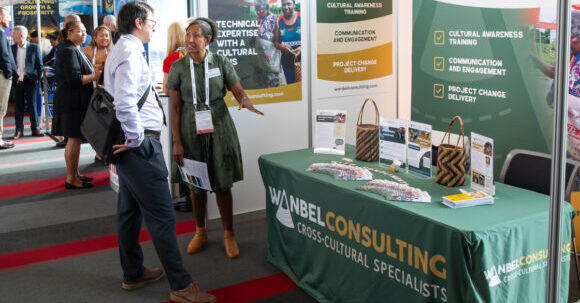Papua New Guinea holds tremendous potential for foreign investors. However, understanding of local cultural nuances is critical to developing relationships and achieving long-term business success in the country, writes Maryanne Kepui of Wanbel Consulting Cross-Cultural Specialists.

Maryanne Kepui (centre right), founder of Wanbel Consulting, exhibiting at the 2024 Business Advantage Papua New Guinea Investment Conference. Credit: BAI/Stefan Daniljchenko
For investors starting out in Papua New Guinea, it can be tempting to approach business with a transactional mindset. But anyone hoping to establish a long-term presence in PNG would be best-served by adopting the relationship-style model of doing business that is typical of Pacific cultures.
In this model, time is the most important currency. It takes time to nurture and grow genuine partnerships that open doors to positive working relationships. At its core is understanding cultural nuances and the social fabric of how businesses, communities, clans, families and faith intersect.
“In a country as diverse as PNG, the more local the better.”
When you have this context, you can better serve clients by identifying potential roadblocks early on in the process and working together collaboratively to solve them. This is not just good social awareness; it is also a critical enabler for setting up all parties for success.
Small wins, big gains
Taking note of cultural nuances that might seem small or inconsequential to outsiders can often lead to breakthroughs in doing business in PNG.
Consider these concepts:
- “The big man in the room”: In meetings in PNG, people typically defer to the most senior person in the room. Foreign investors have been known to find themselves in meetings where there is complete quiet, only to discover that this is because they have been directing their attention to the wrong person in the room. Identifying who the “big man” in the room is early on in a meeting can help make the process run more smoothly.
- “Island time”: This concept exists across the Pacific Islands, and PNG is no different. In many cultures, a meeting set for 2pm is expected to begin at 2pm. But people in PNG are more casual in their approach to time, and it is not uncommon for meetings to begin a little later than scheduled.
- When a meeting begins, it’s considered polite to engage in a bit of chit-chat before talking business. It is seen as rude to talk business before asking how a person is. Once you know somebody well enough, it wouldn’t be inappropriate to go beyond surface level and ask about aspects of their life, such as their family, in a one-on-one setting.
Getting the messaging right
Another thing that can seem inconsequential to some – but which is hugely important in a Papua New Guinean context – is localised messaging.
Wanbel recently worked with a client which found that its messaging wasn’t quite resonating in key stakeholder meetings. We worked with the client to emphasise a local angle in its presentations, which also took into account PNG concepts such as status and hierarchy.
Examples of localised messaging could be as simple as making sure that the imagery in a PowerPoint presentation reflects the local area of the people you engage with. Rather than using Shutterstock, this could mean hiring a local design agency to provide images – or even running your own photoshoot on the ground.
In a country as diverse as PNG, the more local the better. For example, when looking to partner with stakeholders in Southern Highlands Province, then presenting images and case studies which take into account cultural preferences and taboos is bound to be well received. If drilling down to a provincial level isn’t possible, then doing so at a regional level – such as using Highlands Region context for a Southern Highlands or Enga Province audience – is preferable.
Ultimately, genuine care and respect are key to build long-term relationships, and that begins with understanding small cultural nuances. And hopefully, with time, all these small concepts will lead to big things for your business.
Maryanne Kepui is the Founder and Principal Consultant of Wanbel Consulting Cross-Cultural Specialists, a small business established in 2021 delivering cultural awareness training, communication services and project change delivery for those interested in PNG.









Speak Your Mind